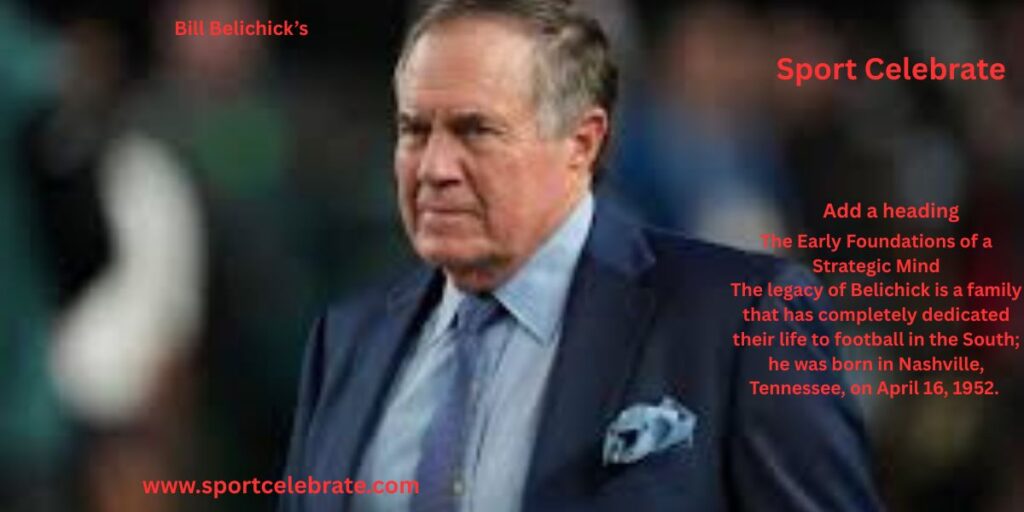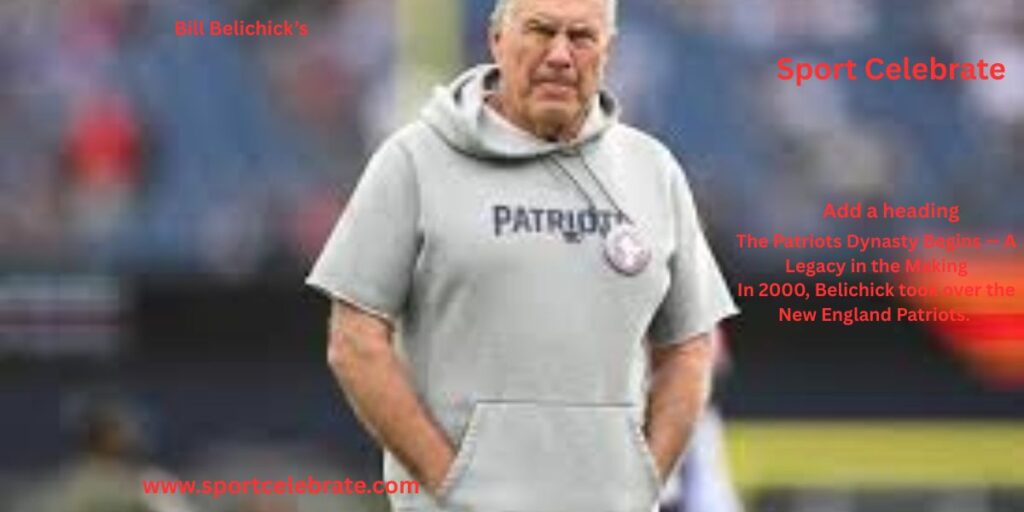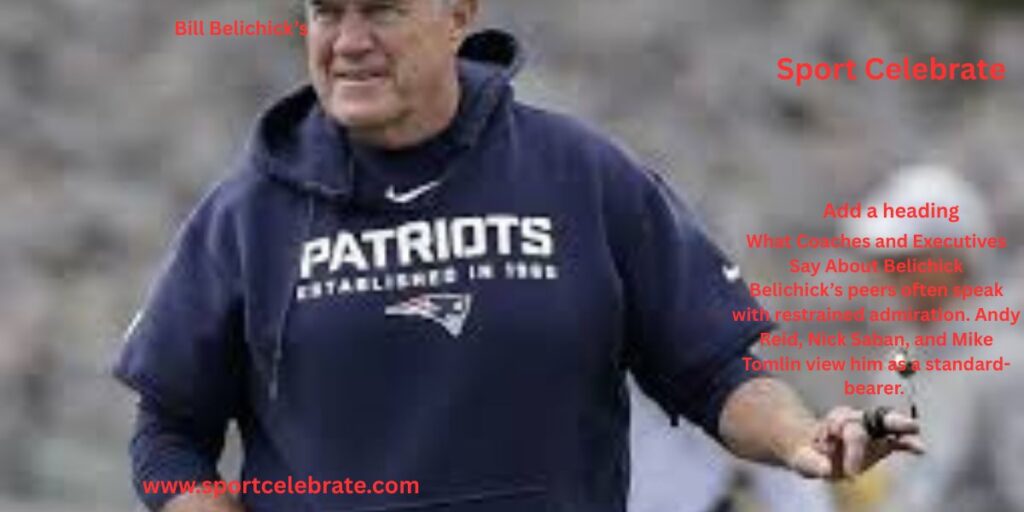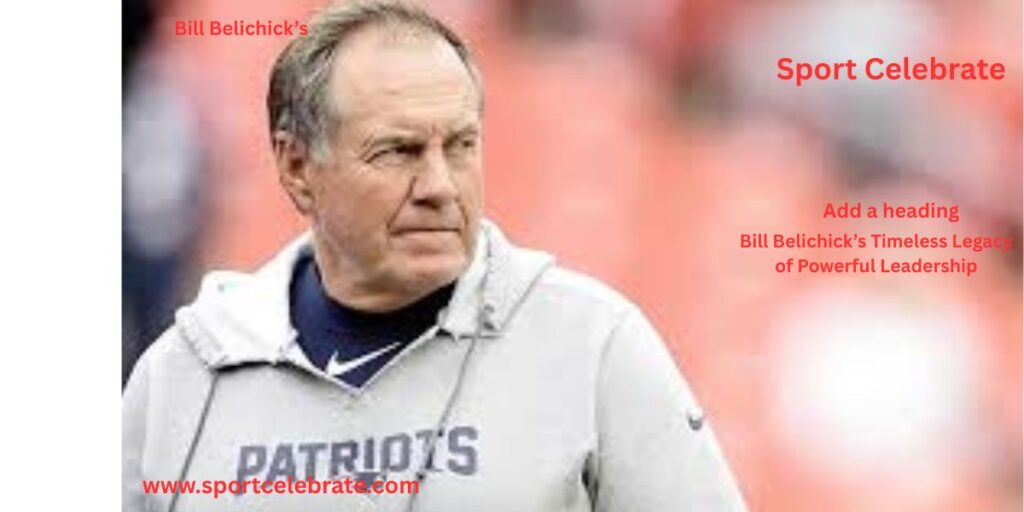Every era has a leader whose influence outlives his wins and losses. Bill Belichick is one of those players in NFL history who made his football legacy with his football IQ, his iron discipline, and his strategic genius.
During his long career, he has practically redefined what an NFL head coach should be—not by extravagant shows, but through systems, consistency, and sometimes even controversies.
This article thoroughly analyzes the leadership legacy of Bill Belichick, revealing through his journey, methods, errors, and teachings one could take from him to apply even in non-sports cases.
The Early Foundations of a Strategic Mind

The legacy of Belichick is a family that has completely dedicated their life to football in the South; he was born in Nashville, Tennessee, on April 16, 1952.
His father, Steve Belichick, was a scout and coach throughout a lifetime of pro football.
That family background—talking about strategies, watching films, hunting recruits—provided Bill with an early immersion into the world of football coaching thinking.
He attended Wesleyan University before transferring (or engaging) with advanced football studies. (His formal football education later flourished at the University of North Carolina football program later in life.) From his youth, he absorbed the idea that coaching ethics and attention to detail matter as much as X’s and O’s.
In his adolescence, Belichick got involved with scouting and assistant coaching, besides learning the game slowly but surely. The formative years of this brilliant coach’s life were the foundation of the football future dynasty, which depended to a greater extent on intelligence in doing things and less on big names and changes.
Crafting a Defensive Mastermind — Giants Era
Belichick’s breakthrough in the NFL coaching career narrative came as a Defensive coordinator under the New York Giants, working under Bill Parcells.
He helped design defenses that could stifle even elite offenses. During that time, he played a major role in building around Lawrence Taylor, a defensive icon.
Under his era, the Giants won Super Bowl titles (XXI, XXV) with Belichick contributing to the defensive game-planning. His work in that period showcased early signs of game strategy mastery: flexible fronts, situational adaptation, and deep opponent study.
Peers often cite that as the moment Belichick’s reputation for defensive innovation took hold. That proved crucial: even when he later led full teams, his core remained defense-forward, trusting that a unit with discipline can win games consistently.
Trials, Turmoil & Lessons — Browns and Jets Stints
Belichick’s first shot as an NFL head coach came with the Cleveland Browns in 1991. That era wasn’t laced with trophies—but it was rich in growth. He dealt with roster constraints, front office interference, and media scrutiny. His record in Cleveland: 37–45 overall.
He briefly accepted the New York Jets head coaching job, only to resign the next day. Many saw that as a flop; Belichick treated it as a lesson in clarity and values. Those experiences hardened him. He learned to protect his autonomy, set boundaries with media, and value process over immediate approval.
The takeaway? Not every chapter is glamorous. Leadership sometimes demands enduring hardship and adapting. Belichick’s struggles in Cleveland and Jets taught him resilience, humility, and the importance of institutional control—traits he’d carry into his New England era.
The Patriots Dynasty Begins — A Legacy in the Making

In 2000, Belichick took over the New England Patriots. Under owner Robert Kraft, he gradually molded a Patriots roster and culture defined by precision, adaptability, and a “Do Your Job” ethos.
When starting quarterback Drew Bledsoe got injured in 2001, Belichick pivoted to Tom Brady, a low-profile draft pick (sixth round). That gamble, supported by a coaching staff aligned with his philosophy, launched the Patriots into sustained excellence.
Over 24 seasons, Belichick led New England to six Super Bowl titles—the most by any NFL head coach in history. The Patriots also won 17 division titles and made 13 AFC Championship appearances.
His leadership style here crystallized: meticulous preparation, situational flexibility, empowering assistants, and trusting role players.
Leadership Off the Field — Building Systems, Not Stars
What separates Belichick from many coaching legends is his belief in systems over singular personalities. He didn’t chase superstars—he built schemes that got maximum output from undervalued players. One season could see him draft a wildcard punter or cornerback who became a starter.
He emphasized film study, situational scripts, and unpredictable play-calling. His teams would shift defenses mid-drive or call rarely used formations. That kept opponents guessing. In a league where scouting and analytics now dominate, Belichick was ahead of the curve.
His version of empowerment: clear expectations and accountability. Assistants and coordinators had room to innovate—but always within a disciplined structure. That balance between autonomy and alignment underlies much of his coaching ethics and football legacy.
🌟 Original / Rare Insight (Table Format)
Real-Life Case Study — Malcolm Butler’s Super Bowl Interception

One of the most iconic plays in Super Bowl history came in Super Bowl XLIX. With seconds left, the Patriots led the Seattle Seahawks 28–24. The Seahawks attempted a pass at the goal line. Malcolm Butler, an undrafted rookie signed off the street, intercepted it.
That moment reflects Belichick’s leadership: trusting preparation and invisible players. Butler had practiced in the slot corner role, watched film nonstop, and earned Belichick’s trust despite limited visibility. Belichick gave a player whom few bet on the chance to make history.
Lesson: Leaders create opportunities for those who prepare, no matter their status. Greatness is often quiet until it’s not.
Media Mistrust & the ‘No‑Excuses’ Mentality

Belichick cultivated a public persona that many found aloof. He rarely revealed strategy in press conferences. He deflected praise or blame, saying repeatedly, “On to Cincinnati,” or “We’ll see.” That guarded posture wasn’t arrogance—it was discipline and protection of the team.
Through the Spygate scandal (2007) and Deflategate controversy (2015), the media scrutinized Belichick intensely. Yet he rarely backed down, insisting ethics and standards mattered. He managed the noise carefully, shielding his coaching staff and players as much as possible.
That “no excuses” mindset reinforced accountability. In his locker rooms, it always came back to performance. If you didn’t execute, you owned it. That message stuck with assistant coaches up to star players.
The Evolving Leader — Adapting Post‑Brady Era
When Tom Brady departed for Tampa Bay in 2020, many predicted Belichick’s collapse. Instead, he shifted. The Patriots roster entered a transition era with Mac Jones and younger players stepping up. Results wavered, but the defensive strategy often remained elite.
That said, the post-Brady years exposed challenges: injuries, roster gaps, and inconsistent results. In 2023, New England finished 4–13, the worst mark in Belichick’s Patriots tenure. The transition revealed that systems can only carry you so far when vital pieces age or depart.
Still, the shift showed his willingness to adapt, evolve, and recalibrate strategy. That adaptability is at the heart of true leadership.
What Coaches and Executives Say About Belichick

Belichick’s peers often speak with restrained admiration. Andy Reid, Nick Saban, and Mike Tomlin view him as a standard-bearer. His coaching tree includes many head coaches across the NFL today.
One table of peers & quotes:
| Person | Role | View on Belichick |
| Nick Saban | College Coach | “He treats every detail like life or death.” |
| Mike Tomlin | Steelers HC | “He demands consistency; that’s hard to live up to.” |
| Andy Reid | Chiefs HC | “He changed the meaning of defense in years.” |
He’s also cited in business, the military, and academia for his leadership template. That cross-domain respect underscores his reach beyond merely Super Bowl titles and wins.
Belichick’s Playbook for Timeless Leadership
Here’s a distilled set of principles from Bill Belichick’s leadership legacy—applicable in sport or any field:
- Prioritize preparation over talent
- Embrace adaptability and change
- Lead by example with discipline and accountability
- Empower others within a structured system
- Minimize distractions; protect your mission
These tenets reflect how he turned challenges (like Spygate or Deflategate) into opportunities to reinforce his philosophy. The man built not a team but a culture.
Conclusion
When we think of Bill Belichick, a person who has been a great leader on and off the field, he comes to mind. His football legacy is an extraordinary mixture of suffering, tactics, and unyielding discipline.
He turned the tide at one point; he was the architect behind the New England Patriots dynasty and the one who drew a plan for the next candidates of head coaches in the NFL who are looking to be the best.
His time in the NFL is over, but he is still a great influence on coaching standards, strategies, and the development of players in the new place, that is, the University of North Carolina and beyond. Some day, his impact might be greater than the Super Bowl titles he has won—and it will be a leadership model written in history.
FAQs
How many Super Bowl titles has Bill Belichick won?
He’s won six Super Bowl titles as a head coach and two more as a defensive coordinator.
What makes Bill Belichick’s leadership unique?
His success comes from preparation, adaptability, discipline, and football intelligence.
What are Spygate and Deflategate?
Spygate involved illegal videotaping; Deflategate was about underinflated footballs—both brought major controversy.
How did his early career shape him?
Working with the Giants, Colts, and under mentors like Bill Parcells shaped his defensive strategy mindset.
Is Belichick close to breaking Don Shula’s win record?
Yes, with 333 total wins, he’s just 14 shy of Don Shula’s 347-win record.

Will Smith, founder of SportCelebrate.com, shares the best sports gear and celebration finds to fuel your passion and joy.






